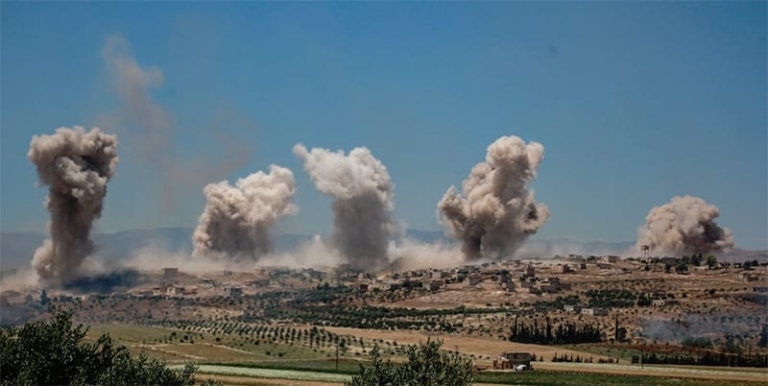
Over the last few weeks, the Syrian regime began its assault on Idlib, the Hama countryside, and other areas in Syria’s northwest. This is where the last of the Syrian armed opposition is deployed after the regime’s success in restoring its control over large swathes of territory, most importantly Damascus and its surrounding areas and Aleppo and its countryside. Over the last two years, crucial support from Russia and Iran-affiliated militias—which have operated in the country since the early months of the war—has enabled Bashar al-Assad to consolidate power over these areas.
With tepid American assistance, in the last few months Turkey was able to force a postponement of the Idlib assault by using diplomatic tools of engagement with Russia. Idlib was one of the de-escalation zones agreed to at the meeting in Astana, Kazakhstan in July 2017. Russia reneged on the Astana understandings each time it found an opportunity, aiming to increase pressure on the opposition and strengthen the regime’s position—such as what happened in Daraa in the south and the countryside of Damascus.
Considering this record of Russian behavior and the failure that beset the last round of the Astana talks, which were held in the Kazakh capital on April 26, Turkey did not appear surprised when the assault began on towns and villages in Idlib’s countryside. There, the regime committed a number of massacres by using barrel bombs against civilian targets. In the beginning Turkey protested to Russia, but apparently to no avail. The Trump Administration remained silent about the attack, which was interpreted by the Syrian regime as an indirect endorsement of its aim to rid the area of Hay’at Tahrir al-Sham (formerly al-Nusra Front) following the failure of peaceful resolutions to the Idlib dilemma that Ankara had previously proposed.
Turkey’s main worry is that the military operation against Idlib will bring about an unprecedented humanitarian crisis by increasing the number of expellees and refugees on its border with Syria.
Turkey’s main worry is that the military operation against Idlib will bring about an unprecedented humanitarian crisis by increasing the number of expellees and refugees on its border with Syria. To be sure, many civilians left the area of Kfar Nabouda, a town that witnessed fierce fighting between regime troops and militias and the armed opposition, resulting in the death of 160 civilians over the last month. Almost all the civilians from Qalaat al-Madiq and the towns of the Ghab Plain and southern Aleppo province also fled the fighting to ill-equipped and poorly provisioned camps on the Turkish border. In fact, the United Nations put the number of refugees from the last bout of fighting at 200,000. What has added to the seriousness of the situation is the return of the Syrian air force to bombing vital installations such as schools and hospitals in a continuing strategy of laying waste to areas that welcomed the opposition over the last few years.
Regional and International Imbalances
Since President Donald Trump’s arrival at the White House, the Syrian conflict has almost disappeared from the American policy agenda, despite its impact and connection to other regional and humanitarian issues. Even when, in May, more than 400 members of Congress sent the president a letter urging him to play a leading role in forging a resolution to the Syrian civil war, his unpredictability continues to define his management of the conflict. Trump did respond forcefully when, in April 2018, the Syrian regime used chemical weapons against civilians in Khan Sheikhoun by striking Syrian army military targets—though after notifying Russia of the targets. But overall, his attention to Syria has been even less than that of former President Barack Obama; indeed, it was diverted toward dealing with North Korea and Iran, where he still has not posted many achievements.
Trump’s attention to Syria has been even less than that of former President Barack Obama; indeed, it was diverted toward dealing with North Korea and Iran, where he still has not posted many achievements.
This has had tremendous impact on Russia, whose regime has realized that Syria will not be a priority for the United States. Today, Trump remains silent on what is happening in Idlib, as if he is giving Russia and the Assad regime the chance to finish the job as quickly as they can.
Such developments have made Turkey’s position very difficult. Ankara rejects the military operation in Idlib because of the many negative repercussions on its security; yet it is unable to resist Russian pressure. It also feels alone with no discernible American support. For these reasons, Turkey has resorted to secretly supporting the opposition forces in Idlib with weapons, and this may have helped them in their battle to retake Kfar Nabouda only a few hours after the town’s occupation by the regime.
On the other hand, Iran remains fully supportive of the Assad regime’s defeat of “terrorism” and has pursued a policy of ending pockets of resistance in Syria. This commitment to the regime’s success may also be seen as a message to Iran’s domestic opposition that the leadership in Tehran would not hesitate to repeat the same Syrian scenario in Iran itself to preserve the clerical regime. Iran thus has an interest in ending the Idlib phenomenon. In fact, the Syrian opposition may be looking at its last battles as Turkey feels abandoned, the United States avoids involvement in finding a peaceful resolution, and Russia and Iran insist on a military solution for the crisis.
Iran remains fully supportive of the Assad regime’s defeat of “terrorism” and has pursued a policy of ending pockets of resistance in Syria. This commitment to the regime’s success may also be seen as a message to Iran’s domestic opposition.
The Future of the Idlib Battle
If the Syrian regime continues with its assault on Idlib province and the Hama countryside using indiscriminate attacks by its air force, three million Syrians will be at high risk of serious danger. Idlib is the last northern territory inside Syria that they call home, and with the Turkish border closed to more refugees, there will be no other place to which they could relocate. The regime’s record during previous operations in Daraa and Eastern Ghouta does not bode well for Idlib’s inhabitants. This is why opposition fighters in the region are likely to resist until death. Hay’at Tahrir al-Sham also has no other place to go, given its history as previously affiliated with al-Qaeda.
While the battle for Aleppo in 2016 was hell on earth, in the words of former United Nations Secretary-General Ban Ki-Moon, the battle for Idlib is likely to be an even worse inferno because of its humanitarian impact and the expected high death toll—especially that Turkey is no longer able to receive large numbers of refugees. This makes it imperative that the Trump Administration respond to the aforementioned letter by members of Congress by becoming more involved in trying to resolve the Syrian conflict and playing a bigger role in connecting the objective of a political solution to that of eradicating terrorism. Tweets alone are not enough. Additionally, a more vocal international drive is needed to pressure Russia to end the current tragic developments. Such efforts should not concentrate on simply postponing the Idlib offensive for a few months but on arriving at a political solution that ends the widespread suffering of the Syrian people.
A more active American involvement will most likely effect a regional rebalancing following some tipping in favor of Iranian interests at the expense of the Arab world.
Furthermore, a more active American involvement will most likely effect a regional rebalancing following some tipping in favor of Iranian interests at the expense of the Arab world. Iran has indeed benefited from the defeat of the Islamic State, and this increases the risks of sectarian divisions instead of moving toward long-term reconciliation and stability. The Trump Administration must also work from a broader perspective that goes beyond dealing with Syria as merely a humanitarian crisis. Syria needs to make progress in its political transition to elected democratic institutions, ones that can become pillars of a regional system that confronts Iran. After all, this is specifically what animated Secretary of State Mike Pompeo’s “hard-line” speech on May 20 that challenged Iran’s role in the region.

